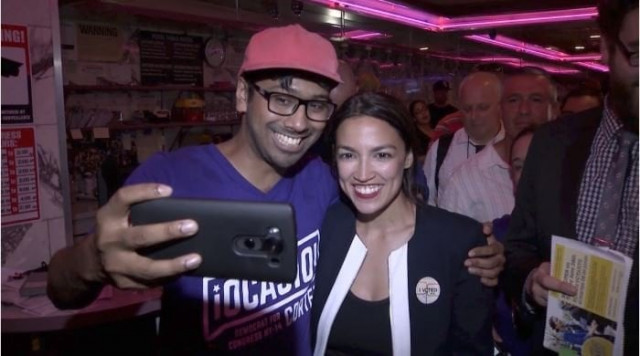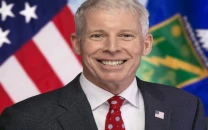American socialist, 28, discovers secret of 99 per cent
Former campaign worker for Senator Bernie Sanders is likely to win her strongly Democratic district in November

PHOTO REUTERS
Joseph Crowley was not expecting a serious challenge in his 11th run for the House of Representatives. He had money, power and what looked like an appropriately progressive agenda for a congressional district in a minority-majority district in New York City. Ocasio-Cortez seemingly had just ethnicity, gender, enthusiasm and a powerful video. She took 57 per cent of the vote.
The former campaign worker for Vermont Senator Bernie Sanders is likely to win her strongly Democratic district in November. That would already be a triumphant historic irony, as her district includes Corona, Queens. That is the home of the fictional Archie Bunker, the famous bigot in the 1970s Norman Lear television comedy “All in the Family”.
It's time for a New York that works for all of us.
On June 26th, we can make it happen - but only if we have the #CourageToChange.
It's time to get to work. Please retweet this video and sign up to knock doors + more at https://t.co/kacKFI9RtI to bring our movement to Congress. pic.twitter.com/aqKMjovEjZ
— Alexandria Ocasio-Cortez (@Ocasio2018) May 30, 2018
Bunker would certainly not welcome his likely new representative. Nothing personal, of course, he might say, but a person of colour just cannot understand working white people’s problems. Yet even that knee-jerk response might be softened when he heard one of Ocasio-Cortez’s slogans.
“We’ve got people, they’ve got money.” Those words could travel well past New York’s outer boroughs. They even have the potential to bond Ocasio-Cortez’s natural supporters with many of the discontented voters who helped elect Donald Trump as US president.
Think back to the last great round of populist discontent, which emerged in the newly industrialising countries on both sides of the Atlantic at the end of the 19th century. Many new captains of industry were then promoting the ideology of free-market liberalism, which held contracts sacred and workers in contempt.
Once taboo, socialism finds comrades among US millennials
Socialism, one political response, identified class conflict and called for a revolution. The Catholic Church provided more subtle analysis. Pope Leo XIII, in the encyclical “Rerum Novarum” of 1891, argued that there was no fundamental conflict between groups searching for power. Rather, he saw a scandal of profound mistreatment of workers. “To misuse men as though they were things in the pursuit of gain ... that is truly shameful and inhuman.”
This photo is from Nov. 14, 2017. Alexandria Ocasio-Cortez, 28, was then working as a bartender.
Less than a year later, she defeated the likely next Speaker of the House, and will almost certainly be the youngest woman ever elected to Congress pic.twitter.com/JgHjdQWAF6
— Jeff Stein (@JStein_WaPo) June 27, 2018
The alternative vision eventually did very well. The worst abuses of capitalism were tamed, many children of the oppressed working class migrated into the comfortable middle class and the welfare state protected human dignity.
Almost a century later, Leo’s successor John Paul II restated the original idea for modern societies, writing of the need to guarantee “the primacy of the person over things”. The economy should serve humanity, not the other way around.
These days, money is probably the “thing” which has the most primacy over people. The moneyed elite do what they will, including taking firm control of traditional political parties through lax campaign-finance rules. Ballooning executive remuneration, shrinking tax payments from the very rich and the expansion of a financial über-class are other markers of money power.
In contrast, while most of the people live materially comfortable lives by any historical standard, many of them struggle for financial and job security. The meritocracies of education and professional success which were set up in response to the last threatened rebellion are not working well. Decent healthcare is a luxury. Money often has much more influence on who succeeds than raw ability.
“We’ve got people, they’ve got money.” That could be a description of reality, in both the troubled communities where Ocasio-Cortez has been a social organiser and in middle-class homes of many of Archie Bunker’s spiritual descendants.
.@Ocasio2018 led a movement. She rejected corporate donors. She took bold progressive policy positions. She collected petitions in the snow, and knocked on doors in the heat. The future of working people in New York is brighter today, and it’s because of Alexandria Ocasio-Cortez.
— Cynthia Nixon (@CynthiaNixon) June 27, 2018
As a slogan for political action, it may be a simple reminder of the power of numbers in democracies. As a social statement, it is a reminder that when money is used to undermine human dignity, something is amiss in a society.
That truth might bridge some wide political chasms. Ocasio-Cortez has the sort of progressive, more-government agenda that repels Republican voters. However, if she or her followers could articulate the basic indignation at the power of money, then many of Pope John Paul’s “persons” might overlook the particular agenda, and identify with the demand to be more valued than things.
World's top Marxism expert has a crush on China's socialist model
Of course, the Ocasio-Cortez effect might be local and fleeting. The excitement over the 2011 Occupy Wall Street movement petered out quickly. And the protest movements which have made the most political headway since then in Europe and the United States have turned their enmity on less fortunate members of the group Ocasio-Cortez identifies as “we”.
Still, perhaps inadvertently this new congressional candidate’s slogan articulates an appealing and unifying message in a way which even her much more experienced mentor Sanders did not quite manage. The “we” without money have a great potential for people power, and not only in the United States.
The corporate-political-financial elite are not in danger yet. But the defence of human dignity can be even more powerful than money. Just ask Joe Crowley.



















COMMENTS
Comments are moderated and generally will be posted if they are on-topic and not abusive.
For more information, please see our Comments FAQ